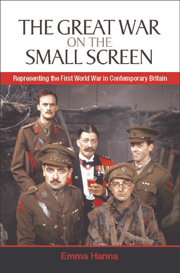Book contents
- Frontmatter
- Contents
- Acknowledgements
- List of abbreviations
- List of illustrations
- Introduction
- 1 An Unhealed Wound: Britain and the First World War
- 2 A Monumental Monument: The Great War (BBC, 1964)
- 3 Survivors: Veterans and the Nature of Personal Testimony
- 4 Heroes and Villains
- 5 Drama, Comedy and Drama Documentary
- 6 Over the Top: Reality Experiential Television
- 7 The Fear of Forgetting
- Filmography
- Bibliography
- Index
4 - Heroes and Villains
Published online by Cambridge University Press: 05 August 2013
- Frontmatter
- Contents
- Acknowledgements
- List of abbreviations
- List of illustrations
- Introduction
- 1 An Unhealed Wound: Britain and the First World War
- 2 A Monumental Monument: The Great War (BBC, 1964)
- 3 Survivors: Veterans and the Nature of Personal Testimony
- 4 Heroes and Villains
- 5 Drama, Comedy and Drama Documentary
- 6 Over the Top: Reality Experiential Television
- 7 The Fear of Forgetting
- Filmography
- Bibliography
- Index
Summary
During the late 1990s, the eightieth anniversary commemorations of wartime events were marked by a handful of single-episode and short-series documentaries. The most significant programmes focused on specific events and personalities, such as the alleged incompetence of the British High Command, the alleged crucifixion of a Canadian soldier and the men executed by courts martial. The onscreen discussion of these issues represented a shift in the ways in which the First World War was presented on British television. These programmes based their narratives on the loss and futility of the First World War by concentrating on the trenches of the Western Front. In the tragedy of the trenches of 1914–18, these programmes sought to clearly define the heroes and villains of the conflict; the heroes were the tens of thousands of men who were killed, maimed and traumatised in attacks engineered by the war's alleged villains, the British High Command.
Lions Led by Donkeys
The reputation of Britain's military commanders of the First World War has not fared particularly well since the Armistice. The idea that British generals shared mule-like characteristics has proved enduring, especially since Alan Clark attributed the saying to German Generals Ludendorff and Hoffmann in The Donkeys. However, the first postwar publication to use this phrase was written by a junior officer, Peter Thompson, of the Royal Army Service Corps, and published in 1927.
- Type
- Chapter
- Information
- The Great War on the Small ScreenRepresenting the First World War in Contemporary Britain, pp. 89 - 115Publisher: Edinburgh University PressPrint publication year: 2009



